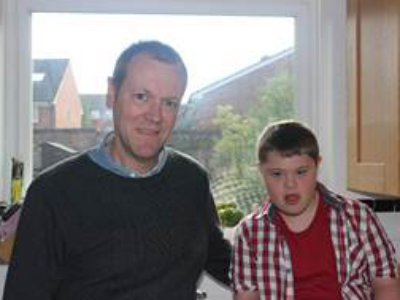
I see the social care world from two sides. I work in the sector as press manager at the Social Care Institute for Excellence. I’m also a dad to a teenager who has Down’s Syndrome (in fact I’ve just written a book about us).
My son receives, and will always receive, social care and support but until his birth I wasn’t aware of many social care issues.
My own experiences amounted to knowing that my grandmother, in 1991, lay on the floor and froze to death; she had dementia and had recently lost her husband, my grandfather. She left a note saying: “Cecil died”. And as a family we were aware that dementia care and support was, for want of a better word, lacking. These days, my uncle has dementia and although that’s challenging, his care is far more structured and strategically considered than my grandmother’s was.
When Stan was born I had little idea of social care and support. I was working at the BBC, who were brilliant with me both when Stan was born and when he had his heart operation that year. On my return to work my first mission became to put more stories about disability on air. I remember getting presenter Tom Watt to cover the issue of how people with learning disabilities were to be denied entrance into the 2008 Paralympics in Beijing after someone infiltrated the Spanish basketball team in Sydney 2000.
‘I was unprepared for the number of appointments’
But, while my knowledge about learning disabilities had increased, I was unprepared for the number of health and social care appointments that Stanley needed to go to. We didn’t differentiate between ‘health’, ‘social care’ and ‘education’. At first you develop an understandable scepticism to all practitioners and you tend to remember the worst things – done or said – more than the others. That can perhaps be rather unhealthy, ushering in a ‘them and us’ mentality. Almost 13 years later, largely thanks to working at SCIE, I know that one way to address this is via co-production.
Our work on co-production is one of the things I’m most proud of at SCIE. Rather than asking people with care and support needs to sit round a table and then write up what they say, there’s been a change. Those people, and their carers, are now ‘consultants’; what we call ‘experts-by-experience’. I suppose I’m one of those myself by doing the following: Banging the table on Sky News when there’s a story about Down’s Syndrome in the news; fulfilling my role as a parent governor at Stan’s special school; and helping new parents who have a recent diagnosis of Down’s.
But I know of a handy way to explain co-production. It’s been written by my SCIE colleague, Cecilia Mercer, who has created an easy-read blog about co-production. I think it’s a great way of explaining what, at first, can seem to be a complex issue. We think it’s going to be really helpful, especially to people with learning disabilities who want to be part of the co-production revolution.
Hopefully in my book I’ve shown how Stan contributes greatly as well; by dancing at the Barnet schools festival with his friends and getting rapturous applause from the parents of non-disabled children; by encouraging a whole mainstream school to use Makaton sign language in assembly; and by just being out in public as part of an extended family. Heavens; we could almost be normal.
‘An invaluable resource’
One recent product launch was probably not covered much in the mainstream or social care trade press. The Alzheimer’s Society and the British Institute for Learning Disabilities have brought out a resource; it’s to help explain dementia to people with learning disabilities.
This can be handy for us as a family, because I don’t want to keep telling Stan that my uncle is ‘ill’. We don’t want to shield Stan from things and attempt to keep him in a child-like bubble (don’t start me on ‘mental ages’) So, when he’s older, I want Stan to know about people we know who have died, and even go to their funerals. Challenging perhaps but it’s the right thing to do.
It’s rare that I write about how my personal and professional worlds collide but I’m glad Community Care asked me to. Walk up to a stranger and introduce the concept of co-production and they might feel bamboozled. Having witnessed the benefit of it firsthand in both my job and outside of work I realise the value of how my colleagues, in a co-productive way, have made this accessible to those very people it’s designed to help.


 Bournemouth, Christchurch and Poole
Bournemouth, Christchurch and Poole  Hampshire County Council
Hampshire County Council  Lincolnshire County Council
Lincolnshire County Council  Norfolk County Council
Norfolk County Council  Northamptonshire Children’s Trust
Northamptonshire Children’s Trust  South Gloucestershire Council
South Gloucestershire Council  Wiltshire Council
Wiltshire Council  Wokingham Borough Council
Wokingham Borough Council  Children and young people with SEND are ‘valued and prioritised’ in Wiltshire, find inspectors
Children and young people with SEND are ‘valued and prioritised’ in Wiltshire, find inspectors  How specialist refugee teams benefit young people and social workers
How specialist refugee teams benefit young people and social workers  Podcast: returning to social work after becoming a first-time parent
Podcast: returning to social work after becoming a first-time parent  Podcast: would you work for an inadequate-rated service?
Podcast: would you work for an inadequate-rated service?  Family help: one local authority’s experience of the model
Family help: one local authority’s experience of the model  Workforce Insights – showcasing a selection of the sector’s top recruiters
Workforce Insights – showcasing a selection of the sector’s top recruiters 

 Facebook
Facebook X
X LinkedIn
LinkedIn Instagram
Instagram
Comments are closed.